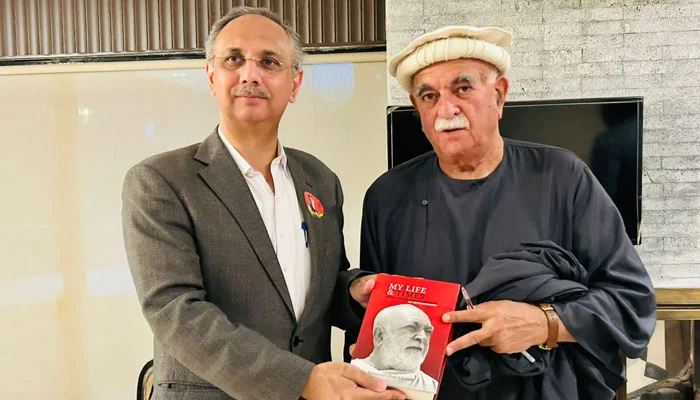Barrister Hafeez Ahmed Khan
Title: PTI Nominates Mehmood Khan Achakzai for Pakistan’s Presidency: A Symbolic Move with Far-Reaching Implications
The political landscape in Pakistan is abuzz with anticipation as the Pakistan Tehreek-e-Insaf (PTI), a major political party, has officially nominated Mehmood Khan Achakzai as their candidate for the presidency. This strategic move carries significant symbolism and has implications that extend beyond the upcoming elections.
Mehmood Khan Achakzai, the President of the Pakhtunkhwa Milli Awami Party (PkMAP), is no stranger to the political arena. His unwavering advocacy for Pashtun rights and his bold anti-establishment stance have made him a prominent figure in Pakistani politics. As the SIC’s nominee for the top constitutional position, Achakzai embodies the values and aspirations of the Sunni Ittehad Council (SIC).
In the National Assembly, Achakzai made headlines with his impassioned plea for upholding the Constitution and ensuring the supremacy of parliament. His call to end interference in politics by the establishment resonated with those who champion democratic principles. Additionally, he demanded the immediate release of imprisoned PTI leader Imran Khan, emphasizing that the people had voted for him.
The PTI’s decision to nominate Achakzai reflects a calculated strategy. By fielding their own candidate, PTI aims to assert its presence and influence in the presidential elections. This move comes after the PTI’s alliance with the SIC, which occurred when the PTI’s party symbol was withdrawn.
Moreover, PTI’s recent actions have sent clear signals to its opponents. The appointment of Ali Amin Gandapur as Chief Minister of Khyber Pakhtunkhwa (KPK) demonstrated PTI’s resolve to consolidate its position in the province. Simultaneously, PTI’s letter to the International Monetary Fund (IMF) underscored its commitment to struggle for rigged free elections even at the cost of economic stability and reform.
However, PTI’s alignment with peripheral politicians like Achakzai raises questions. Achakzai’s regionalist stance and advocacy for Pashtun rights may clash with PTI’s broader federalist vision. The PTI’s decision to side with those who prioritize nationalism over federalism seems paradoxical.
Pakistan’s institutions must recognize that the PTI is the sole federal party capable of uniting the nation. Sidestepping PTI weakens the fabric of federalism. Therefore, it is imperative to conduct free and fair elections, addressing any concerns of rigging once and for all.
As the presidential election approaches, the nation awaits the outcome. Mehmood Khan Achakzai’s candidacy represents not only a symbolic move but also a pivotal moment in Pakistan’s political trajectory. The choice between democracy, parliamentary supremacy, and federalism hangs in the balance, and the electorate’s decision will shape the future of the country.
Ahead of the crucial presidential elections, the Sunni Ittehad Council (SIC) has taken a significant step by nominating Mehmood Khan Achakzai, the President of the Pakhtunkhwa Milli Awami Party (PkMAP), as their candidate for the top constitutional position in Pakistan.
Mehmood Khan Achakzai, a prominent political figure, is known for his unwavering advocacy for Pashtun rights and his anti-establishment narrative. His selection as the SIC’s nominee reflects the council’s commitment to changing the political environment and presenting a candidate who embodies their values and aspirations for the nation.
The formal announcement of Achakzai’s candidacy was made by the SIC, signaling their endorsement of his leadership and vision. Subsequently, the council submitted the nomination papers for Mehmood Khan Achakzai to the Islamabad High Court. His proposer was Ali Muhammad Khan, a PTI leader backed by the SIC. Other party leaders, including Omar Ayub Khan, Latif Khosa, and Amir Dogar, accompanied them to the high court.
During the court proceedings, Latif Khosa addressed the Chief Justice, expressing their anticipation that they would be called into the chamber and offered tea. In response, Chief Justice Aamir Farooq assured them that tea could be served afterward. He also noted that both Omar Ayub and Ali Muhammad Khan were appearing in court for the first time.
Meanwhile, sources within the Pakistan Tehreek-e-Insaf (PTI) revealed a strategic approach toward the presidential elections. The PTI, which allied with the SIC after its party symbol was withdrawn, decided not to concede the electoral arena to the PPP’s Asif Ali Zardari, the joint nominee of the PML-N and the PPP. Instead, the PTI is actively considering fielding its own candidate for the presidency, emphasizing its determination to play a significant role in shaping the country’s leadership.
The upcoming presidential election will be closely watched, with candidates vying for the prestigious office of Pakistan’s President. The scrutiny of nomination papers is scheduled for March 4, followed by the release of the final list of contenders. On March 9, polling will take place at the Parliament House and the four provincial assemblies, with the Chief Justices of the High Courts serving as presiding officers. Mehmood Khan Achakzai’s candidacy represents a pivotal moment in Pakistan’s political landscape, and the nation awaits the outcome of this crucial election. However, it is unfortunate that more than 250 seats of NA and PA seem to be rigged, as per an assessment by Republic Policy Organization in their post-election analysis.
Please, subscribe to the YouTube channel of republicpolicy.com

















































